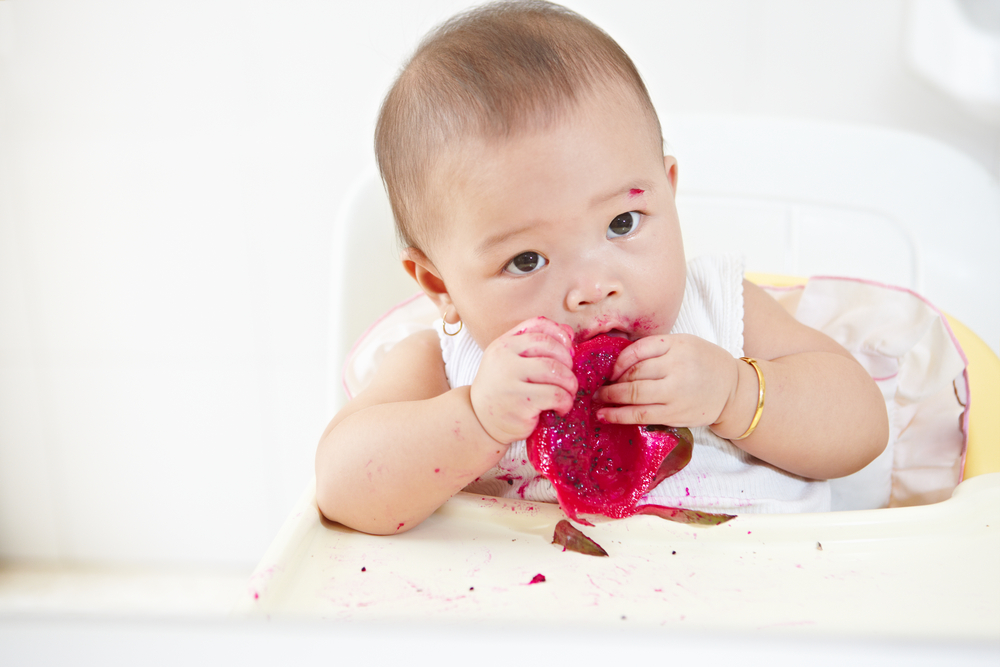Dragon fruit is simple to prepare despite its uninviting appearance. Then, you can either leave the skin on and eat the fruit with a spoon or peel it off and consume it in bite-sized pieces.
Babies six months and up can have dragon fruit without worry. Tropical fruit is an excellent source of healthy nutrients for your newborn. It contains high amounts of healthy nutrients like calcium, magnesium, fiber, vitamin C, and antioxidants like beta-carotene.
Dragon fruit is safe for infants and young children when consumed in moderation and combined with other fruits. However, due to its relatively high fiber content, dragon fruit may cause considerable stomach irritation if consumed daily.
A puree is the safest and most effective method when introducing dragon fruit to a newborn. That way, you don’t even have to chew the food to absorb all the nutritional elements. Dragon fruit puree is made by crushing and mashing the fruit until there are no more chunks of fruit remaining.
When it comes to dragon fruit, some parents are wary of the numerous tiny black seeds. The seeds pose zero health risks and can be consumed with confidence. Health advantages might be expected from the seeds due to omega-3 fatty acids.
The seeds are harmless and can be safely consumed; once digested, they will be passed through the body unharmed. In addition, it’s perfectly natural and will encourage regular bowel movements.
How Do I Introduce Dragon Fruit To My Baby?
Fruits like dragon fruits are a good source of vitamins and minerals and may be suitable for his health, but not all fruits are suitable for infants under one. Find out if it’s safe to feed your child dragon fruit by reading this article.
If your baby is approaching 6 months old and ready to start eating solid foods, you should give your baby a variety of new foods every few days or weeks. In addition to the expected pureed veggies, rice, and soup, you may want to include some fruits in his diet.
The first and most crucial step in introducing a new meal to a child is to determine whether or not they have an allergy to that item. Watch for allergic reactions like rashes or swelling in the mouth and lips while giving dragon fruit to your little one.
In addition, the digestive tract might be irritated by certain foods, leading to symptoms including diarrhea and gas. Finally, allergy sufferers should wash their fruit carefully because it may contain pollen.
Because of the high levels of vitamin C in dragon fruit, they also tend to be somewhat acidic. Due to the potential for gastrointestinal irritation, infants should not be introduced to fruit until they have tried other, less reactive foods. Don’t hesitate to call your child’s pediatrician if you have any concerns.
Is Dragon Fruit Good For Children?
Most parents report success introducing their infants to dragon fruit at around the six-month mark, thanks to its mild flavor and soft texture. In addition, the pulp from a dragon fruit can be pureed or mashed to make an easy-to-digest meal.
You can start incorporating the fruit into other foods, such as porridge, if your baby has no problems digesting the fruit. Then, around the age of nine to ten months, you can start giving your baby healthful finger foods such as quarters of peeled, dense dragon fruit pulp.
Then, as your child develops a better pincer grasp, you can start giving them small, thin dragon fruit wedges or pieces around 12 months. Dragon fruit without skin presents a choking hazard due to its potential slipperiness. Keep a close eye on your child as they try to feed themselves dragon fruit.
To prepare dragon fruit for your baby once they have started solids, just split it in half, remove the hard seeds, and scoop out the edible flesh. Red dragon fruits are preferable to white ones because they taste better for a baby.
Getting your kid to eat without fuss is more manageable if he enjoys the flavor. For example, blueberries, apples, cranberries, and peaches pair well with dragon fruit, which can be pureed and eaten on its own or with other fruits.
Who Should Not Eat Dragonfruit?
Dragon fruit has many health benefits due to its high concentration of antioxidants, including vitamin C and other antioxidant components like phytonutrients, polyphenols, and carotenoids.
Incorporating this fruit into one’s diet can provide several health and beauty benefits. These benefits, however, are not equally accessible to everyone. As a result, those allergic to dragon fruit should stay well away from it. Dragon fruit can induce severe allergic reactions, including swelling of the lips and tongue, an itchy throat, a burning sensation in the throat, and other symptoms.
Overeating dragon fruit, despite the fruit’s reputation for reducing hypertension and high blood pressure, might cause a potassium overload and a subsequent drop in blood pressure. In addition, insomnia, nausea, fatigue, depression, and even loss of consciousness are signs of hypotension, which occurs when blood pressure drops below normal levels.
An excess of antioxidants like beta-carotene from overeating dragon fruit has been linked to an increased risk of developing lung cancer. In addition, consuming more vitamin E is associated with an increased risk of hemorrhagic stroke.
One can consume dragon fruit in its raw form or prepare it for various drinks, spreads, and sweets. In addition, the blossoms are versatile since they can be utilized in food or as a flavorful addition to herbal teas.
Overeating dragon fruit, despite the fruit’s reputation for reducing hypertension and high blood pressure, might cause a potassium overload and a subsequent drop in blood pressure. In addition, insomnia, nausea, fatigue, depression, and even loss of consciousness are signs of hypotension, which occurs when blood pressure drops below normal levels.

